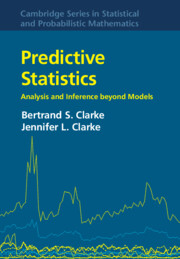
-
Select format
-
- Publisher:
- Cambridge University Press
- Publication date:
- 27 April 2018
- 12 April 2018
- ISBN:
- 9781139236003
- 9781107028289
- Dimensions:
- (253 x 177 mm)
- Weight & Pages:
- 1.33kg, 656 Pages
- Dimensions:
- Weight & Pages:
You may already have access via personal or institutional login
Book description
All scientific disciplines prize predictive success. Conventional statistical analyses, however, treat prediction as secondary, instead focusing on modeling and hence estimation, testing, and detailed physical interpretation, tackling these tasks before the predictive adequacy of a model is established. This book outlines a fully predictive approach to statistical problems based on studying predictors; the approach does not require predictors correspond to a model although this important special case is included in the general approach. Throughout, the point is to examine predictive performance before considering conventional inference. These ideas are traced through five traditional subfields of statistics, helping readers to refocus and adopt a directly predictive outlook. The book also considers prediction via contemporary 'black box' techniques and emerging data types and methodologies where conventional modeling is so difficult that good prediction is the main criterion available for evaluating the performance of a statistical method. Well-documented open-source R code in a Github repository allows readers to replicate examples and apply techniques to other investigations.
Reviews
'Prediction, one of the most important practical applications of statistical analysis, has rarely been treated as anything more than an afterthought in most formal treatments of statistical inference. This important book aims to counter this neglect by a wholehearted emphasis on prediction as the primary purpose of the analysis. The authors cut a broad swathe through the statistical landscape, conducting thorough analyses of numerous traditional, recent, and novel techniques, to show how these are illuminated by taking the predictive perspective.'
Philip Dawid - University of Cambridge
'The prime focus in statistics has always been on modeling rather than prediction; as a result, different prediction methods have arisen within different subfields of statistics, and a general, all-encompassing account has been lacking. For the first time, this book provides such an account and, as such, it convincingly argues for the primacy of prediction. The authors consider a wide range of topics from a predictive point of view and I am impressed by both the breadth and depth of the topics addressed and by the unifying story the authors manage to tell.'
Peter Grünwald - Centrum Wiskunde & Informatica and Universiteit Leiden
'The book Predictive Statistics by Bertrand S. and Jennifer L. Clarke provides for an interesting and thought-provoking read. The underlying idea is that much of current statistical thinking is focused on model building instead of taking prediction seriously.'
Harald Binder Source: Biometrical Journal
Contents
Metrics
Altmetric attention score
Full text views
Full text views help Loading metrics...
Loading metrics...
* Views captured on Cambridge Core between #date#. This data will be updated every 24 hours.
Usage data cannot currently be displayed.
Accessibility standard: Unknown
Why this information is here
This section outlines the accessibility features of this content - including support for screen readers, full keyboard navigation and high-contrast display options. This may not be relevant for you.
Accessibility Information
Accessibility compliance for the PDF of this book is currently unknown and may be updated in the future.


